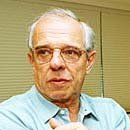


Brazil's Attorney General Wants Drugs Decriminalized
"I favor the decriminalization of drug use," says Márcio Thomaz Bastos, to a Congressional Committee

By Al Giordano
A Narco News Global Alert
April 17, 2003
The battle is on in the Lula administration to form a new drug policy, and the biggest gun yet has entered the battlefield on the side of Civil Society: Attorney General Márcio Thomaz Bastos.
Bastos, 67, longtime personal defense attorney for Brazilian President Lula da Silva dating from when Lula was a union leader at the helm of a “shadow government” in 1989, made his position crystal clear at an April 2nd congressional hearing in the capital city of Brasilia.
“I favor the decriminalization of drug use,” Bastos told members of the Permanent Committee on the Constitution and Justice, according to a transcript obtained by The Narco News Bulletin.
Bastos, testifying before the Congressional Committee on various matters relating to the Ministry of Justice (akin to the U.S. Justice Department in Brazil), answered a question posed by Congressman Vicente Arruda, who asked:
“I would like to know… what you think about the decriminalization of drug use. I would also like to know if Your Honor will try to assemble a group to examine the problem with the goal of filing legislation that represents the consensus of this House.”
Congressman Arruda said that drug decriminalization is “a point that I consider fundamental.”
Bastos answered:
“Deputy Vicente Arruda spoke of the anti-drug law and its amendments, currently under review. There is also the legislation of Deputy Gabeira that seeks to reduce the penalties. I find that the legal norms are deformed and mutilated and effectively need to be reformed in order to be effective. I favor the decriminalization of drug use, and the addition of substitute measures, in order to achieve more effectiveness in the application of the law and to avoid a situation in which users fall into the hands of the police.”
Thus, the Attorney General of the nation of Brazil went beyond endorsing merely the concept of drug decriminalization. He also spoke favorably about a specific drug legalization bill: one filed by Congressman Fernando Gabeira of Rio de Janeiro, a longtime proponent of legalization.
Social Fighter
Bastos is not just any member of the Lula administration. A close friend and the longtime personal attorney for the new president, he has spent his life fighting for social justice. “In his more than 40 years of experience, he has won more than 700 cases in front of juries,” notes a website of the Workers Party of President Lula. Bastos has also defended José Rainha of the “Sem-Terra” landless peasants’ movement, and successfully prosecuted the assassins of Amazon rubber farmer union leader and environmentalist Chico Mendes.

Attorney General Márcio Thomaz Bastos
Bastos’ position in favor of drug legalization is no secret. According to the Workers Party: “Márcio Bastos has various polemic ideas such as the legalization of marijuana and other drugs, external control of the Judiciary and the widening of alternative sentencing.”
Last August, in an interview published by a law firm, Bastos said, “I am in favor of the decriminalization of all drugs that exist, because the impossibility of use increases the trafficking. It’s the same as occurred during the epoch of the Dry Laws. When that was established in the United States, in the 1920s, the illegality of contraband grew beyond limits… In 1976, when the drug laws were discussed in Brazil, we debated Article 12… from the large smuggler caught with hundreds of kilos of cocaine to the kid who gives marijuana to his girlfriend. But the law was applied poorly. In sum, it is precisely in order to strengthen the combat against drugs – in relation, also, to the money laundering machines – that it is necessary to decriminalize drug use.”
And that, kind reader, is what makes the Attorney General’s statement, in a public Congressional hearing, even more interesting: The Congressman who asked the question, like every other aware politician in Brasilia, already knew Bastos’ position: The point was to get it on the record, for the first time, while Bastos serves in the highest law enforcement position in the land.
It is also interesting that Congressman Arruda is a member of a rival political party – the PSDB-CE (the Brazil Social Democracy Party – Center-Left), the party of former president Henrique Cardoso. In June of 2002, Arruda fought, unsuccessfully, for the inclusion of decriminalization in the country’s newest drug laws.
The movement is much wider, kind readers, than the one inside Lula’s governing coalition.
“Bastos made such remarks but actually I guess he would rather say he is in favor of ending drug prohibition. Of course, if you are a Minister you have to be very careful about what you say,” observes Luiz Paulo Guanabara, president of Psicotropicus, a new national anti-prohibitionist group. “There are lots of intelligent people in Brazil who clearly realize the failure of the North American drug policy and how it violates basic human rights.”
Guanabara (also a contributing writer and translator at Narco News Brasil) adds: “The members of the government you have already quoted are doing the good job of bringing the discussion of decriminalization to the mainstream democratic debate. And by doing so they also trigger drug policy discussion. As those issues gain momentum in the Brazilian media, passionate stances and personal or corporative interests arise on the other side, too. But today we are finally breathing democracy in Brazil and common sense is likely to prevail. Anyway drug users are getting ever more organized, just in case!”
The Conflict Spills Over
What is occurring today in Brazil includes a conflict inside the halls of government that, in a coordinated and intentional manner, is spilling into public view to bring Civil Society into the fight. First came the statement, reported by Authentic Journalist Adriana Veloso of Narco News, by Regina Benevides of the Health Ministry, supporting the use of “Harm Reduction” strategies to reduce the damages of drug use, including those caused by drug prohibition. Then came the public statement by the nation’s top cop, Luiz Eduardo Soares, speaking at a public forum in Porto Alegre last week.
But what is disappointing – although not surprising – is that in spite of the fact that the Attorney General publicly spoke in favor of decriminalization of drug use, and brought attention to Gabeira’s legislation in Brasilia, the Commercial Media – even with reporters present during his testimony – chose not to report this major story.
Not to worry, kind readers: The Narco News Team is here, in Brazil, picking up every stone left unturned by the Commercial Media and putting our practice of Authentic Journalism into action.
And as you will see from our next report – in which the Health Ministry now makes its pro-decriminalization position official – there are Authentic Journalists from at least one major daily newspaper in this country who are in contact with Narco News and who are now investigating and reporting the story, too.
The public officials, Authentic Journalists, and members of Civil Society who are fighting for truth, and for a more just drug policy… a democratic one, free of foreign impositions… now know that their words will be reported in the original Brazilian Portuguese, and, importantly, translated into English and Spanish: so that the battle underway will not happen in that darkness and that it may resonate and draw the necessary national and international solidarity to bring forward the idea – decriminalization of drugs – whose time has come.
Lea Ud. el Artículo en Español
- The Fund for Authentic Journalism
For more Narco News, click here.




